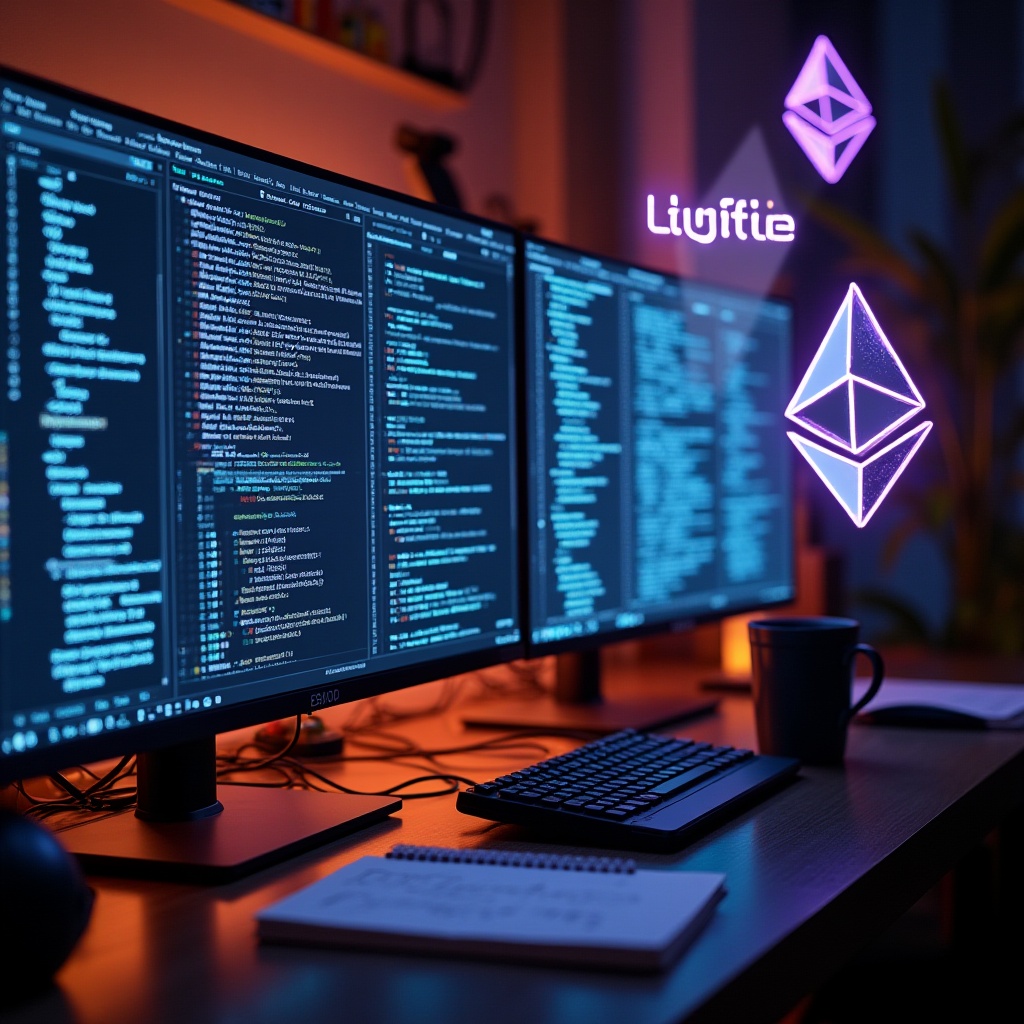Imagine a world where smart contracts don’t just execute predefined instructions but can adapt, negotiate, and make decisions autonomously. This is the vision that Fetch.ai is bringing to life through its innovative AI agent technology. At the heart of this transformation is the Artificial Superintelligence Alliance (ASI), a collaboration between Fetch.ai, SingularityNET, and Ocean Protocol. This alliance aims to democratize AI by creating a decentralized network where AI services are accessible to all, not just tech giants. For developers and tech enthusiasts, this represents an opportunity to be at the forefront of a new era in blockchain technology. By integrating AI agents into smart contracts, we’re moving toward a future where decentralized applications are more intelligent, responsive, and capable of complex decision-making. In this article, we’ll explore how Fetch.ai’s AI agents are set to revolutionize smart contracts, the role of the ASI alliance in this transformation, and how you can be part of this exciting journey.
Understanding Fetch.ai’s AI Agent Alliance
Formation of the Artificial Superintelligence Alliance
In a groundbreaking move, Fetch.ai, SingularityNET, and Ocean Protocol—three pioneers in decentralized AI and blockchain technologies—merged to form the Artificial Superintelligence Alliance (ASI). This strategic alliance aims to create a decentralized, open-source AI ecosystem that democratizes access to artificial intelligence. The merger also involved the consolidation of their respective tokens—FET, AGIX, and OCEAN—into a unified token known as ASI. This unified token facilitates seamless interactions across the combined decentralized AI network.
Objectives of the Alliance
The ASI Alliance is driven by a shared vision to advance artificial general intelligence (AGI) in a manner that is open, democratic, and beneficial to all. By integrating their technologies, the alliance aims to accelerate the development of AGI and, ultimately, artificial superintelligence (ASI). Key objectives include: democratizing AI development by creating an open-source AI infrastructure accessible to a broader community; enhancing data sharing through integration with Ocean Protocol to enable secure and efficient data exchange; and fostering ethical AI practices, ensuring that advancements serve humanity collectively rather than a select few.
Significance for Developers
For developers and tech enthusiasts, the ASI Alliance opens up new avenues for innovation: access to advanced AI models such as ASI-1 Mini for building intelligent applications; participation in a decentralized ecosystem that allows contributions to and benefits from a collaborative AI network; and opportunities for collaboration among developers, researchers, and organizations to drive AI innovation. The formation of the ASI Alliance represents a significant step toward a decentralized, inclusive, and ethical AI future, providing developers with the tools and infrastructure to create intelligent applications across industries.
The Role of AI Agents in Smart Contracts
Understanding the Limitations of Traditional Smart Contracts
Traditional smart contracts operate on a “set-and-forget” principle. Once deployed, they execute actions based on predefined conditions without the ability to adapt to changing circumstances or incorporate real-time data. This inflexibility poses challenges in scenarios requiring dynamic decision-making, such as fluctuating market conditions, evolving user preferences, or unforeseen external events. Moreover, these contracts lack the capability to interact seamlessly with external systems or data sources, often relying on oracles to fetch off-chain information. This dependency introduces additional complexity and potential points of failure, undermining the trustless nature of blockchain applications.
Introducing Fetch.ai’s AI Agents
Fetch.ai addresses these limitations through its innovative AI agents—autonomous software entities capable of perceiving their environment, processing information, and making decisions to achieve specific goals. These agents operate within a decentralized network, interacting with smart contracts, external data sources, and other agents to perform complex tasks. Key features of Fetch.ai’s AI agents include autonomy, interoperability across blockchain networks and external APIs, adaptability to changing conditions, and security through a decentralized framework that maintains trustless operations.
Transforming Smart Contracts with AI Agents
By integrating AI agents, smart contracts evolve from static scripts into dynamic, intelligent entities capable of real-time decision making by analyzing current data, automating complex multi-step processes across platforms and services, enhancing user interaction through adaptive responses, and improving efficiency by reducing manual intervention and operational costs. These capabilities unlock new possibilities for decentralized applications to respond to real-world complexities.
Real-World Applications
Fetch.ai’s AI agents have been implemented across various domains: in decentralized finance (DeFi) to automate trading strategies, manage liquidity pools, and execute multi-step arbitrage transactions; in energy management to facilitate peer-to-peer energy trading, optimize consumption, and promote sustainability; in supply chain logistics to monitor shipments, manage inventory, and automate procurement processes; and in smart mobility to coordinate transportation services, manage traffic flows, and optimize routes for more efficient urban systems. These examples demonstrate how AI agents enhance automation, adaptability, and efficiency in decentralized environments.
Fetch.ai’s Agentverse: A Developer’s Playground
A Unified Development Environment
Agentverse offers an integrated, browser-based workspace consolidating the entire development workflow. It includes a code editor, logging console, and file management tools, eliminating the need to juggle multiple external services or manage complex server setups. With predefined templates and real-time code editing capabilities, developers can quickly prototype and iterate on agent designs, whether building a simple “Hello World” agent or a complex AI-driven application.
Seamless Deployment and Continuous Uptime
Deploying agents on Agentverse is straightforward. Once launched, agents remain online and responsive without requiring manual intervention for restarts or hosting management, ensuring uninterrupted service. Additionally, agents register in the Almanac, a central registry acting as a marketplace, allowing other agents and users to discover agents based on their functions and capabilities, fostering collaboration within the ecosystem.
Native Blockchain Integration
Agentverse equips agents with inherent blockchain capabilities. Each agent possesses its own wallet, enabling it to securely send and receive tokens, query balances, and interact directly with smart contracts on-chain. This deep integration allows agents to participate fully in decentralized processes and economies, enhancing their utility and versatility within the Fetch.ai network.
Scalability and Reliability
Agents deployed on Agentverse scale automatically with the number of messages they receive. Developers need not worry about deploying additional instances or managing load balancers. The platform ensures continuous operation and message handling, allowing developers to focus on enhancing functionality rather than infrastructure management.
Security and Trust
Security is paramount in Agentverse. Agents run in secure, partitioned Python environments, protecting code from malicious attempts to access sensitive information. Developers can subscribe to ban lists to ignore agents identified as bad actors, ensuring a trustworthy ecosystem.
Enhanced Discoverability with AgentRank
As the ecosystem grows, finding reliable agents becomes more important. Agentverse integrates AgentRank, a reputation-based system assessing agent activity and trustworthiness. This ensures users can discover high-quality agents suited to their needs, improving overall network usability.
Real-World Use Cases: AI Agents Empowering Smart Contracts
Decentralized Finance (DeFi): Intelligent Financial Operations
In the DeFi sector, AI agents revolutionize financial operations by leveraging real-time data and predictive analytics. They automate trading strategies based on market conditions, manage liquidity pools to optimize returns and reduce risks, and execute complex financial transactions such as cross-platform arbitrage. These capabilities enable responsive, efficient financial systems operating 24/7 without manual intervention.
Supply Chain Management: Enhancing Transparency and Efficiency
AI agents streamline supply chain operations by providing real-time tracking and autonomous decision-making. They monitor inventory levels and reorder supplies automatically when thresholds are reached, offer live updates on shipment locations and statuses to improve transparency, and coordinate with multiple suppliers to optimize procurement. These functionalities create resilient, adaptable supply chains capable of responding to disruptions and demand changes.
Energy Sector: Optimizing Consumption and Distribution
In the energy industry, AI agents facilitate smarter consumption and distribution through dynamic pricing models that adjust rates based on real-time supply and demand, load balancing to prevent grid overloads and reduce waste, and peer-to-peer energy trading enabling consumers to buy and sell excess energy directly. These applications contribute to more sustainable, cost-effective energy ecosystems.
Transportation and Mobility: Facilitating Smart Logistics
AI agents enhance transportation by optimizing routes using traffic data, monitoring fleet performance and maintenance needs to schedule proactive services, and coordinating between different transportation modes for seamless logistics. These improvements reduce operational costs and improve service reliability in smart mobility systems.
Healthcare: Personalizing Patient Care
In healthcare, AI agents monitor patient health by tracking vital signs and alerting providers to potential issues, manage appointments and reminders to reduce no-shows, and analyze patient data to personalize treatment plans. These applications enhance patient engagement and improve health outcomes, demonstrating the impact of AI agents in sensitive, data-driven environments.
Challenges and Limitations of AI-Driven Smart Contracts
Data Privacy and Security Concerns
AI agents often require access to extensive datasets to function optimally, raising concerns about data privacy and security, especially when handling sensitive information. Ensuring compliance with data protection regulations and implementing robust security measures is paramount to prevent unauthorized access and data breaches in decentralized environments.
Computational Resource Demands
Deploying AI-driven smart contracts can be resource-intensive. Training and operating AI models require significant computational power, leading to increased energy consumption and operational costs. This challenge is pronounced in decentralized networks where resources are distributed and limited, necessitating optimization strategies to balance performance and cost.
Integration Complexity
Integrating AI agents with existing blockchain infrastructures and smart contracts can be complex. Differences in programming languages, data formats, and system architectures require the development of interoperable solutions and standardized protocols to facilitate seamless integration and maintain system flexibility.
Reliability and Predictability
AI agents, by nature, learn and adapt over time, introducing unpredictability in their behavior. In the context of smart contracts, which are expected to execute deterministically, this adaptability can challenge consistent and reliable outcomes. Mechanisms to monitor and control agent behavior are essential to maintain trust in automated systems.
Regulatory and Ethical Considerations
The deployment of AI-driven smart contracts intersects regulatory and ethical domains such as accountability, transparency, and legal compliance. Developers and organizations must engage with regulators and ethicists to ensure solutions align with societal expectations and evolving legal requirements, fostering responsible innovation.
The ASI Alliance: A Unified Vision for Decentralized AI
A Convergence of Pioneering Platforms
Each member of the ASI Alliance brings unique strengths: Fetch.ai offers a purpose-built blockchain platform supporting autonomous AI agents designed for commercial applications; SingularityNET provides a decentralized platform for AI algorithms, models, and services; and Ocean Protocol facilitates secure data exchange preserving privacy. By integrating these platforms, the alliance seeks to streamline individual offerings into a cohesive ecosystem, enhancing interoperability and scalability.
The ASI Token: Unifying the Ecosystem
A cornerstone of the alliance is merging the individual tokens—FET, AGIX, and OCEAN—into a single ASI token. This unified token simplifies transactions and interactions across platforms, fostering a seamless user experience and enhancing fluidity between decentralized AI services.
Implications for Developers and the Broader Ecosystem
For developers, the ASI Alliance presents expanded opportunities: enhanced interoperability through a unified token and integrated platforms, access to diverse AI models, data sets, and services accelerating innovation, and collaborative development within an open-source framework. For the broader ecosystem, the ASI Alliance signifies democratizing AI, ensuring its development and benefits reach a wider audience by uniting the capabilities of Fetch.ai, SingularityNET, and Ocean Protocol under a shared vision and token.
The Road Ahead: What’s Next for Fetch.ai and the ASI Alliance
Expansion of the ASI Ecosystem
Following the successful merger, the ASI Alliance focuses on expanding its ecosystem by onboarding new partners, developers, and stakeholders who share the vision of a decentralized AI infrastructure. The alliance aims to foster a collaborative environment where innovation thrives and diverse AI applications emerge.
Development of Advanced AI Models
Building upon the launch of ASI-1 Mini, the world’s first Web3-native large language model, the ASI Alliance plans to develop more advanced AI models designed to support complex agentic workflows and cater to industry-specific needs. The ASI: Train initiative focuses on specialized foundational AI models addressing challenges in science and medical verticals.
Integration with Web2 and Web3 Technologies
To bridge traditional and decentralized systems, the ASI Alliance is integrating Web2 and Web3 technologies, including strategic partnerships with cloud providers to enhance network security and performance. These efforts aim to drive broader adoption of decentralized AI applications by improving infrastructure accessibility and reliability.
Enhanced Interoperability Across Blockchains
Recognizing the importance of interoperability, the ASI Alliance is deploying its unified token across multiple blockchain platforms. This strategy enhances fluidity between networks and advances decentralized AI technologies, creating a multi-chain environment where AI agents can operate seamlessly.
Community Engagement and Decentralized Governance
The ASI Alliance emphasizes community involvement and decentralized governance by empowering token holders and community members to participate in decision-making processes. This approach ensures the development and deployment of AI technologies align with stakeholder interests, fostering transparency and collective stewardship.
The Future of AI Agents in Smart Contracts
Empowering Decentralized Applications
AI agents enhance smart contracts by enabling autonomous operations that execute tasks without human intervention, adaptive learning through machine learning to optimize performance over time, and interoperability that facilitates seamless interactions between blockchain networks and traditional systems. These capabilities empower decentralized applications to offer more sophisticated, user-centric services.
Driving Real-World Impact
The practical applications of AI-integrated smart contracts are vast: in finance for automated trading and risk assessments, in supply chain for real-time tracking and autonomous logistics, and in healthcare for personalized treatment plans and predictive diagnostics. These innovations demonstrate the tangible benefits of merging AI with blockchain technology.
Challenges and Considerations
Despite the promise, several challenges must be addressed: data privacy to ensure confidentiality and security of sensitive information, regulatory compliance to navigate evolving legal landscapes, and technical complexity requiring specialized expertise to develop and maintain sophisticated AI agents. Addressing these issues is critical to the sustainable growth of AI-driven smart contracts.
The Road Ahead
The collaboration between Fetch.ai, SingularityNET, and Ocean Protocol within the ASI Alliance signifies a concerted effort to advance decentralized AI. Their initiatives, including the development of new AI models and strategic partnerships, aim to create a robust, accessible AI ecosystem. As these technologies mature, they are poised to redefine smart contract capabilities and applications, offering more intelligent, responsive, and user-friendly digital systems.





